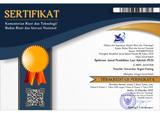The Relationship between Interest in Following Sewing Training and Learning Results in PKBM Ganting Pesisir Selatan
 ), Jalius Jalius(2),
), Jalius Jalius(2), (1) Universitas Negeri Padang
(2) Universitas Negeri Padang
 Corresponding Author
Corresponding Author
DOI : https://doi.org/10.24036/spektrumpls.v9i1.110058
Full Text:
 Language : en
Language : en
Abstract
This study aims to determine the relationship between interest in participating in sewing training and learning outcomes in the South Coast Ganting District Court. The proposed hypothesis is that there is a positive relationship between interest in attending sewing training and learning outcomes of learning citizens. The more interested the residents learn to take sewing training, the better their learning outcomes will be. And vice versa, the more people are not interested in learning to participate in training, the results obtained will not be good. The type of research that researchers use is correlative research using a quantitative approach. The population in this study were the sewing training participants this year. The data collection technique used was a questionnaire and the tools used were a questionnaire. The data analysis technique used the percentage formula and the Spearman Rho formula. The results of this study indicate that: 1) the participants' interest in learning in sewing is good; 2) the learning outcomes of the sewing training participants are classified as good; 3) There is a significant relationship between the Interests in Participating in Sewing Training and Learning Outcomes in PKBM Ganting Pesisir Selatan. Suggestions from this research are that because there is a significant relationship between interest in attending sewing training and learning outcomes, it is necessary for the tutor to improve the implementation of sewing training, by making interesting learning media, methods and strategies that will increase motivation so that participants are active in participating all training activities so that their implementation can run more conducive.
Keywords: Interest, Sewing Training, Learning Results
References
Aini, W. (2006). Bahan Ajar Konsep Pendidikan Luar Sekolah. Padang: FIP UNP.
Daryanto. (2013). Inovasi Pembelajaran Efektif. Bandung: Yrma Widya.
Dimyati. (2009). Belajar dan Pembelajaran. Jakarta: Rineka Cipta.
Dimyati, & Mudjiono. (2006). Belajar dan Pembelajaran. Jakarta: Rineka Cipta.
Djamarah, S. B., & Zain, A. (2010). Strategi Belajar Mengajar. Jakarta: Rineka Cipta.
Fathurrohman, M. (2012). Belajar dan Pembelajaran. Yogyakarta: Teras.
Hurlock, E. B. (2013). Psikologi perkembangan: Suatu Pendekatan Sepanjang Rentang Kehidupan. Jakarta: Penerbit Erlangga.
Kamil, M. (2012). Pendidikan Nonformal Pengembangan Melalui Pusat Kegiatan Belajar Mengajar (PKBM) di Indonesia (Sebuah Pembelajaran dari Komikan Jepang). Bandung: Alfabeta.
Marzuki, S. (2012). Pendidikan Nonformal Dimensi dalam Keaksaraan Fungsional, Pelatihan, dan Andragogi. Bandung: Remaja Rosdakarya.
Pamungkas, A. H., Sunarti, V., & Wahyudi, W. A. (2018). Peran PKBM dalam Peningkatan Pertumbuhan Ekonomi dan Kesejahteraan Hidup Masyarakat Sesuai Target SDGs. SPEKTRUM: Jurnal Pendidikan Luar Sekolah (PLS), 1(3), 301–307. https://doi.org/10.24036/spektrumpls.v1i3.101240
Sardiman, A. M. (2010). Interaksi dan Motivasi Belajar Mengajar, Raja Grafindo Persada. Jakarta: Rajawali Press.
Slameto. (2013). Belajar dan Faktor-Faktor Yang Mempengaruhi. Jakarta: Rineka Cipta.
Soelaiman, J. (2006). Konsep Dasar Pendidikan Luar Sekolah. Jakarta: Bumi Aksara.
Sudjana, N. (2016). Penilaian Hasil Proses Belajar Mengajar. Bandung: Rosdikarya.
Sugiyono. (2015). Metode Penelitian Pendidikan: Pendekatan Kualitatif, Kuantitatif, dan R&D. Bandung: Alfabeta.
Undang-Undang No. 20 tahun 2003 Tentang Sistem Pendidikan Nasional. (2003). Jakarta: Departemen Pendidikan Nasional.
Widodo. (2018). Metodologi Penelitian Populer & Praktis. Jakarta: Raja Grafindo Persada.
Winkel. (2004). Psikologi Pendidikan dan Evaluasi Belajar. Jakarta: Gramedia Pustaka Utama.
Winkel. (2014). Psikologi Belajar. Jakarta: Gramedia Pustaka Utama.
 Article Metrics
Article Metrics
 Abstract Views : 162 times
Abstract Views : 162 times
 PDF Downloaded : 63 times
PDF Downloaded : 63 times
Refbacks
- There are currently no refbacks.

This work is licensed under a Creative Commons Attribution-NonCommercial 4.0 International License.



